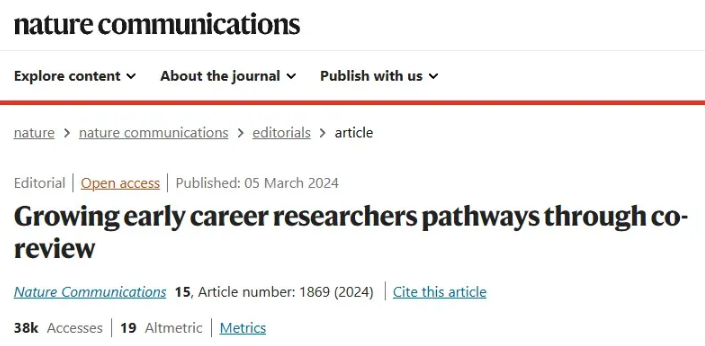Please click the button below to go to our email login page
|
Attention!NC is piloting a new review method!Recently, Nature Communications (abbreviated as NC) published an article “Growing early career researchers pathways through co-review” on Editorials, which mentions that to help early career researchers (ECRs), mainly PhD students, postdoctor, and other young researchers, better integrate into the peer review process of journals and to ensure that their contributions are properly recognized, NC recently launched the official trial of the co-review scheme!
What is co-review scheme?
When any scientific workers receive review invitation from NC, they can recommend a young researcher to review together.
Specifically, any invited reviewers can recommend an early scientific worker to editors with his/her name and contact information. The editor will invite the recommended young researchers to serve as co-reviewers. The two co-reviewers will jointly write a review report.
That is to say, if you are a PhD students, postdoctor, or young researcher, when your supervisor, research group leader, or friend receives a review invitation, they can recommend to the editor to jointly review a manuscript!
Meanwhile, your review records will be kept on NC’s system. If necessary, you can also recognize your co-review records through ORCID (Open Researcher and Contributor Identification Code) or other channels.
Why initiate a collaborative review program?
In fact, since 2020, NC has continuously carried out peer review mentoring programs for ECRs for three consecutive years, which aims to provide ECRs with practical skills of peer review via network seminar and practical review training. These plans receive positive feedback and help ECRs improve skills and confidence, while assisting in editorial decision-making in 80% cases.
NC plans to further extend the opportunity of young researchers to participate in peer review, and provide them with an opportunity to acknowledge their review activities.
Inspired by the co-review guidance scheme launched in 2020, the magazine is promoting this scheme throughout the entire journals, encouraging experienced researchers to invite ECRs in peer review, and providing optional online training. Since May, 2023, a small pilot version has already been launched, and about 25% of senior reviewers have accepted the proposal to invite ECR in the review. Now, this measure will be promoted throughout the entire journals.
The implementation of co-review scheme provide valuable opportunity to ECRs, who can participate in real peer review process under the guidance of experienced researchers. This guiding collaboration can not only enhance the skills of ECRs, but also ensure the appropriate recognition of their work.
Also, through co-review, ECRs can directly participate in the experimental part of the research, and their review opinions have comprehensive and professional values. In the meantime, they can learn how to communicate clearly, effectively, and constructively, laying a solid foundation for independent peer review in the future. |

